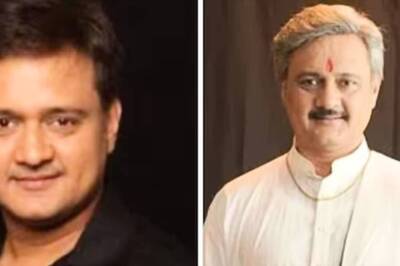
views
At a time when peace was generally thought to be returning in the region, the northeast is again at the flashpoint, protesting against the passing of the Citizenship (Amendment) Bill, 2016.
Protestors in Assam, Tripura, Meghalaya, Nagaland, Mizoram and Manipur are demanding its withdrawal describing it as a legislation that would open the floodgates of demographic imbalance by making the northeast the dumping ground of non-Muslim migrants from Bangladesh.
Anti-bill bodies in these states argue that the indigenous population of the region, numbering only about 1.8 crore will face extermination by the overwhelming migrant population that will come in once the bill becomes an act.
Lalduhawma of the Zoram Nationalist Party of Mizoram has publicly declared that “India will no longer remain a suitable place to live for people in the northeast if this bill is enacted”.
The Coalition for Indigenous Rights Campaign (CIRCA), a Manipur-based civil society organisation, has termed the passing of bill in the Lok Sabha on 8 January as an “act of declaring war on the indigenous people of northeast” and called the people of the region to socially boycott all MPs, MLAs and ministers of the seven states who supported the bill.
CIRCA says the BJP has orchestrated the bill with an “agenda to completely annihilate and wipe out the indigenous people of the northeast by orchestrating a demographic invasion from across the border.”
The unrest witnessed over the proposed legislation has highlighted the flaws in the country’s Constitution as the effort to adopt it violates many fundamental principles of governance and civility.
First, the principle of plurality of the Constitution is violated, threatening the concept of diversity as a unifying character of Indian democracy.
Another constitutional principle that is under threat is the concept of India being a welfare state where any change is acceptable only when it uplifts the well-being of some without jeopardising others.
The fact that the people of northeast are up against the bill calls for a rethink of the bill in its present form before legislation.
Fact of Migration
It is a recorded fact that refugees from Bangladesh who came into the country numbered about 98 lakh till 1972.
The India-Bangladesh Treaty of Friendship, Cooperation and Peace, also known as the Indira-Mujib Treaty, which was signed in 1972 to forge close bilateral relations between India and the newly established state of Bangladesh, is a testament to this fact.
The Illegal Migrants (Determination by Tribunal) (IMDT) Act, was enacted in Parliament in 1983 by the Indira Gandhi government “for determination of the question whether a person is or is not an illegal migrant”.
The IMDT Act described procedures for detection of illegal immigrants from Bangladesh and deport them from Assam.
While detection of foreigners in all other states is done under the Foreigners Act, 1946, the IMDT Act is applicable only to Assam.
While the act was passed to provide special protection against undue harassment of “minorities” affected by the Assam Agitation, the people of the state felt it made deportation of illegal immigrants difficult. The act was also cited as one of the main factors for the rapid rise of the Muslim population and demographic change in Assam.
In a case filed by Sarbananda Sonowal against the Union of India, the Supreme Court struck down the act in 2005 observing that the unabated influx of migrants from Bangladesh is an ‘act of aggression.’
National Register of Citizens (NRC)
According to Clause 5 of the Assam Accord, illegal migrants need to be identified and deported. The NRC was based on 1951 Census and the cut-off date adopted was March 24, 1971.
According to the accord, migrants who came during 1951-1961 were to be allowed citizenship. Those who came during 1961-1971 were denied voting rights for 10 years after which they are given citizenship.
Those who came after March 24, 1971, was to be identified and deported. In December 2018, the first draft NRC was released which threw up at least over 40 lakh illegal migrants. While updating and re-verification is underway, the next logical step of action is deportation.
Deportation
Subsequent to the publication of the first draft of NRC in Assam, Bangladesh Prime Minister Sheikh Hasina declared that there isn’t a single Bangladeshi in India or the country’s northeast.
Even the special advisor to Bangladesh Prime Minister, Gowher Rizvi, said India needed to prove that the illegal immigrants in the northeastern states were indeed Bangladeshis, adding another dimensional complexity to the issue.
Vote Bank Politics
Even though Prime Minister Narendra Modi spoke out strongly in favour of deportation, while addressing election rallies in 2014 in Assam and Manipur and warned illegal immigrants to pack their bags, the BJP’s agenda went through a ‘change of heart’ and became extremely passionate to grant citizenship to Hindus, Jains, Buddhist, Sikhs, Christians and Parsis from Pakistan, Afghanistan and Bangladesh who faced religious persecution.
This leads to the question why the BJP is so keen to get the citizenship bill passed in the run-up to the forthcoming Lok Sabha elections especially when it is only about 60 days away.
Most political analysts suspect the intention is to polarise Hindu and Muslim voters and pose itself as the champion of the former to return to power after the polls.
Procedural Lapses
The bill proposes to grant citizenship to those who have stayed in India for six years up to December 31, 2014.
The anti-bill voice in the northeast has been wondering what is the historical significant of Dec 31, 2014?
In the Assam Accord, the cut-off year was March 24, 1971, whereas in the Manipur People’s (Protection) Bill, passed by the assembly in 2018 and awaiting Presidential nod, the cut off year is 1951. These have strong historical significance.
On March, 1971, Pakistan President Yahya Khan had declared Operation Searchlight and launched a war on the erstwhile east-Pakistan.
The next day, refugees started crossing over to Assam at a rate of 55,000 to one lakh per day.
In Manipur, the anti-foreigners’ movement of 1980 which witnessed the killing of two students in police firing, ended on an agreement between the agitating All Manipur Students Union and the then chief minister RK Dorendra Singh to make 1951 as the cut-off year for naturalisation of illegal migrants when the first Census was first carried out after Manipur merged into the India Union in 1949.
According to that Census, a total of 1,068 outsiders were counted. Another reason for making 1951 the cut off year in Manipur was because on November 18, 1950, the foreigners permit system was revoked in Manipur.
The Passport (Entry into India) Rules 1950 and the Foreigners Order, 1948
Under two different notifications of September, 7, 2015, (GST/3/85 and GST/3/86), amendments were made in the Passport Rules, 1950 and the Foreigners Order, 1948, through a controversial ordinance notification by the ministry of home affairs.
Based on these notifications, December 31, 2014, was taken as the cut-off year and the requirement for a valid document or valid passport were relaxed for the six non-Muslim communities and the requirement for 12 years of stay in India reduced to only 6 years of stay.
Groups protesting against the bill have alleged the notifications were done arbitrarily faulting procedural norms to legalise illegal immigrants even before the Lok Sabha passed the bill. Subsequent to cover up the unconstitutional notifications, the bill was introduced and passed by the Lok Sabha.
The bill, which was slated to be introduced in the Rajya Sabha as a mandatory procedure for it to become an act, is all set to lapse on June 3 as the upper House was adjourned sine die on February 13.
Undemocratic and unconstitutional
The way the bill was passed in the Lok Sabha was highly undemocratic and unconstitutional, as it lacked consensus and did not take into confidence the people of the states concerned.
The bill also goes against the secular spirit of the Constitution by proposing to grant citizenship to only non-Muslim communities.
False Assumption of Religious Prosecution
While the bill assumes the prevalence of religious persecution in the neighbouring countries, the leadership of the nations concerned have rejected the claims as baseless.
Another point that arises is even if religious persecution is a reality, why isn’t India using platforms like SAARC to raise its voice against it?
Movements against illegal migrants have been happening since 1980 in the northeast and hardly any deportation has taken place yet.
This has led to the articulation in the northeast that re-federalisation of the country is the need of the hour if the idea of India is to be sustained. This would bestow more power to the states and give them the authority to protect and use their own natural resources.
The Union government should be accommodative of the feelings and aspirations of the people of northeast.
(Author is a National Award-winning documentary filmmaker based out of Imphal. Views are personal)



















Comments
0 comment